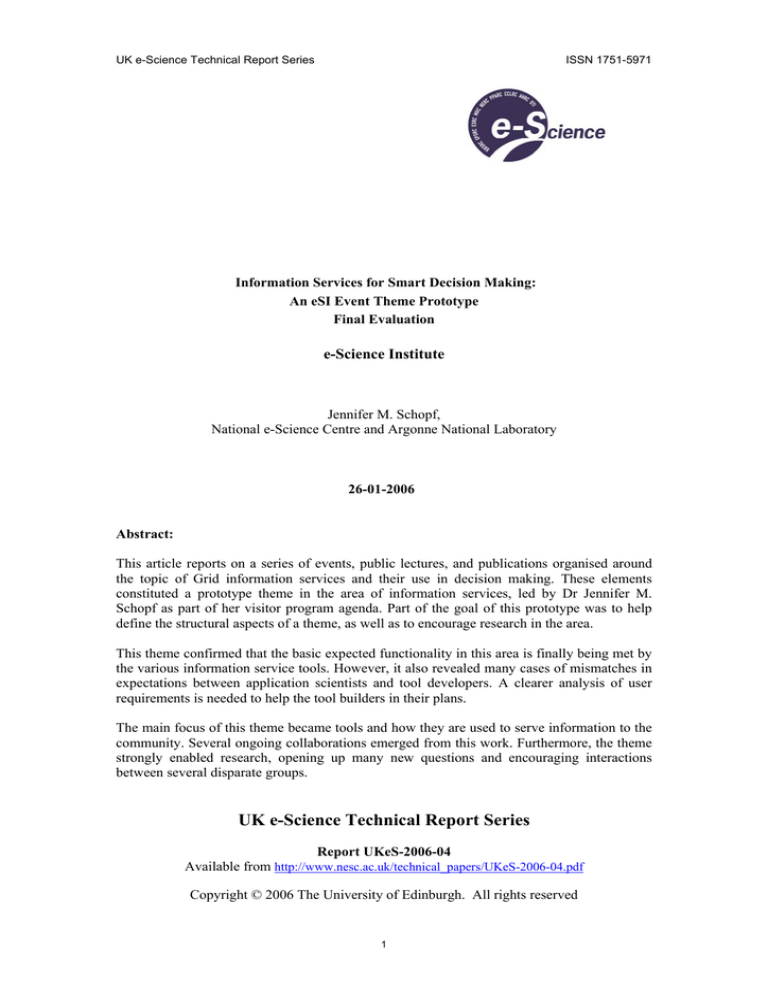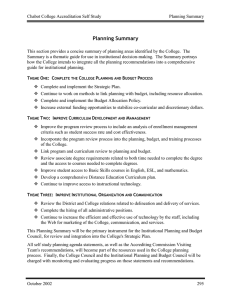
UK e-Science Technical Report Series
ISSN 1751-5971
Information Services for Smart Decision Making:
An eSI Event Theme Prototype
Final Evaluation
e-Science Institute
Jennifer M. Schopf,
National e-Science Centre and Argonne National Laboratory
26-01-2006
Abstract:
This article reports on a series of events, public lectures, and publications organised around
the topic of Grid information services and their use in decision making. These elements
constituted a prototype theme in the area of information services, led by Dr Jennifer M.
Schopf as part of her visitor program agenda. Part of the goal of this prototype was to help
define the structural aspects of a theme, as well as to encourage research in the area.
This theme confirmed that the basic expected functionality in this area is finally being met by
the various information service tools. However, it also revealed many cases of mismatches in
expectations between application scientists and tool developers. A clearer analysis of user
requirements is needed to help the tool builders in their plans.
The main focus of this theme became tools and how they are used to serve information to the
community. Several ongoing collaborations emerged from this work. Furthermore, the theme
strongly enabled research, opening up many new questions and encouraging interactions
between several disparate groups.
UK e-Science Technical Report Series
Report UKeS-2006-04
Available from http://www.nesc.ac.uk/technical_papers/UKeS-2006-04.pdf
Copyright © 2006 The University of Edinburgh. All rights reserved
1
1. Theme Overview
Grid computing resources and services can advertise a large amount of data for many
different use cases. These include providing data so that resource brokers can locate
computing elements appropriate for a job, streaming data so application steering
adjustments can be made during runtime, and notifying system administrators when
changes in system load or disk space availability occur in order to identify possible
performance anomalies.
We proposed to organize a series of events, public lectures, and publications around the
topic of Grid information services and their use in decision making. Specifically, this
involved interacting with people building monitoring systems and trying to better
understand how they can be used with schedulers and by operations and system
administrators, and to better understand performance faults in the context of Grid
applications.
2. About the Theme Leader
Jennifer M. Schopf is a Scientist at the Distributed Systems Laboratory, part of the
Mathematics and Computer Science Division at Argonne National Laboratory. During
the theme, Schopf spent the year as a half-time researcher at the e-Science Institute (eSI)
in Edinburgh, UK. She is a member of the Globus Alliance, and technology coordinator
for the Monitoring and Discovery Service, and spent 5 years helping to establish the
Global Grid Forum standards body. She is currently also employed by the UK National
e-Science Centre (NeSC) and JISC as the e-Infrastructure Policy Advisor.
In addition to her work with the Globus MDS, in the past ten years Schopf has co-edited
a book and co-authored over 30 journal papers, book chapters, and refereed conference
submissions, in large part related to information services, predictions, and their use in
scheduling in Grid environments. She previously organized two workshops on the topic
of Grid performance, and has received multiple grants in support of this work.
Schopf received a BA in Computer Science and Mathematics from Vassar College, and
MS and PhD degrees from the University of California, San Diego in Computer Science
and Engineering.
3. Prototype Theme
This theme, unlike the ones that will follow, grew out of discussions in the planning
phase for the new eSI program. An evaluation of past events was done to determine what
possible themes had already, informally, been done. Looking at the past 12 months and
the next 5 months of planned events (approximately 100 meetings), certain common
topics were present, including:
• Data management
2
•
•
•
•
Biomedical work
Ontologies
Networks/communications
Information services
It was decided that a prototype theme could be done in the area of information services,
to be led by Schopf as part of her visitor program agenda. Part of the goal of this
prototype was to help define the structural aspects of a theme, as well as to encourage
research in the area.
4. Theme Attributes
Themes are meant to consist of a series of events, publications, and visitors. Initially,
there were many possible ways to pursue the range of items that could be included. This
section discusses the items that were part of the prototype theme and the coverage metrics
used to evaluate it.
4.1 Events
The set of events related to this theme included:
•
•
•
•
•
•
eSI lecture: “Distributed Monitoring and Information Services for the Grid”,
Jennifer Schopf, Jan 10, 2005 (19 participants)
Grid Performance Workshop, June 22-23, 2005 (35 participants)
Globus Toolkit GridFTP Days, January 27, 2005 (20 participants, limited by room
size)
GLUE Schema 1.2 Workshop (RAL, Didcot, Oxford), February 2005
UK Globus Week, April 04-08, 2005 (51 participants)
Networks for non-Networkers 2, June 20-21, 2005 (associated, not directed by
TL, 68 participants)
In addition, the research leader gave a set of invited talks and visits, within and beyond
the UK, including:
• Invited Seminar, Cambridge e-Science Centre, Cambridge University, December
6, 2005.
• Invited Seminar, University of Bath, September 30, 2005
• Visit, Rutherford Appleton Laboratory (January 2005)
• Visit, Warwick University (May 2005, Dec 2005)
• Visit, Newcastle University (June 2005)
• Invited talk: “Grid Monitoring and Information Services: Globus Toolkit MDS4
& TeraGrid Inca”, LCG Operations Workshop, CERN November 2-4 2004
• Invited talk: “Globus Toolkit Monitoring and Discovery System: MDS4”,
Technology Review Talk, Argonne Booth, SuperComputing Nov 8-11, 2004,
• Invited talk: “Performance Inside: Performance Monitoring and Diagnosis for
NMI Software and Applications”, NMI Meeting December 2004
3
•
•
Invited talk: “Distributed Monitoring and Information Services for the Grid”,
MSc in High Performance Computing Seminar, EPCC Edinburgh, January 28,
2004
Invited talk: “Distributed Monitoring and Information Services for the Grid”,
Master Class, University of Amsterdam, April 2005
The outreach component to this theme is larger than we expect other themes to have,
partly because of the nature of the work already underway by the research leader in the
visiting program. Several events that were initially planned did not come to fruition due
to time constraints. These include a workshop examining current scheduling issues
(originally planned by the research leader), and several more theoretical workshops by
other associated researchers that were cancelled.
4.2 Publications
Several publications resulted from this work, including
• “Monitoring and Discovery in a Web Services Framework: Functionality and
Performance of Globus Toolkit MDS4”, Jennifer M. Schopf, Ioan Raicu, Laura
Pearlman, Neill Miller, Carl Kesselman, Ian Foster, Mike D’Arcy, submitted to
HPDC 2006, available as MCS Preprint ANL/MCS-P1315-0106, January 2006.
• “OGSA-DAI Status and Benchmarks”, Mario Antonioletti, Malcolm Atkinson,
Rob Baxter, Andrew Borley, Neil P. Chue Hong, Patrick Dantressangle, Alastair
C. Hume, Mike Jackson, Kostas Karasavvas, Amy Krause, Simon Laws, Mark
Parsons, Norman W. Paton, Jennifer M. Schopf, Tom Sugden, Kostas Tourlas,
Paul Watson, and David Vyvyan, Proceedings of the UK eScience All Hands
Meeting 2005, September 2005.
• "Monitoring and Discovery in a Web Services Framework: Functionality and
Performance of the Globus Toolkit's MDS4", Jennifer M. Schopf, Mike D'Arcy,
Neill Miller, Laura Pearlman, Ian Foster, and Carl Kesselman, Argonne National
Laboratory Technical Report ANL/MCS-P1248-0405, 2005.
• “Report of the UK Globus Week 2005”, ed. J.M. Schopf, ANL MCS Technical
Memorandum ANL/MCS-TM-291, National eScience Centre Technical Report
UKeS-2005-06, October 2005, available from
http://www.nesc.ac.uk/technical_papers/UKeS-2005-06.pdf.
• “Report of the International Grid Performance Workshop 2005”, ed. J.M. Schopf,
Argonne National Laboratory MCS Technical Memorandum ANL/MCS-TM-288.
• “Grid Performance Workshop 2004 Meeting Report”, ed. J.M. Schopf,
Mathematics and Computer Science Division Technical Memorandum
ANL/MCS-TM-285, Argonne National Laboratory, National eScience Centre
Technical Report UKeS-2005-05, August 2005, available from
http://www.nesc.ac.uk/technical_papers/UKeS-2005-05.pdf.
In addition, a glossy handout and several posters were developed, for eSI, NeSC,
SuperComputing, and the All Hands Meeting.
4
A special issue on the topic of information services for decision making in e-Science was
considered, and the editors of the Journal of Grid Computing expressed an interest in
such a proposal, but this did not occur due to time constraints.
4.3 Visitors
One aspect of the current eSI themes that was not taken advantage of was inviting
additional visitors to take part in the theme for a period of time outside of just attending
meetings. This was mainly due to the fact that the theme was a prototype, and this was
not available in a timely enough manner.
4.4 Coverage Metrics
Six metrics have been defined to understand the scope of a given theme:
Participants can be experts to new researchers in a field. This theme had a full spread of
participants, but was weighted towards the experts in terms of sheer numbers.
Sector coverage can vary from university to industrial. This theme was evenly covered
across the spectrum.
The research area has been defined on a scale of “arts and humanities” to “science”. This
theme was weighted towards science.
The aspect metric measures where the work sits in the range from practical to theoretical.
This work was heavily weighted towards the pragmatic.
Research issues concerns whether this work is of immediate need or long-term
importance. Much of the work in this theme was oriented towards the present and near
future.
Engagement for a theme can be local/national to international. This work was
international, but weighted towards UK and American, with some EU but very little
Asian participation.
5. Evaluation Summary
Because this theme was a prototype, the summary has two aspects to it – structural
suggestions and technical results.
5.1 Structural Suggestions
Because this theme was started partway through the allotted time period, and because
much of the infrastructure was defined during the course of the theme, it was not able to
take full advantage of the infrastructure now in place. The biggest component this theme
lacked was additional visitors, which would have strengthened the work significantly. It
5
is highly recommended that, as part of any theme, a core set of visitors should be defined
and invited before starting.
The other component that was not in place was the PR and Web infrastructure. There was
no mailing list or formal announcement strategy, and the publicly available materials
about the theme lagged significantly behind the main events. This did not hurt any
individual event, as all were well attended and received strong comments. However, it
did affect the cohesiveness of the theme as a whole.
A year is a very short amount of time to run a set of coordinated events. In addition, there
is a tension between running a good event and spending time working on larger research
issues, as the more preparation that is possible prior to the event, the better the outcome.
That said, having the research leader working on the theme half time and pursuing their
own research half time was a logical use of resources.
5.2 Technical Summary
This theme has brought to light several findings in the e-Science Information Services
community. Discussions with users attending the events confirmed that the basic
expected functionality in this area is finally being met by the various information service
tools. However, over the year we saw in many instances that there was a mismatch in
expectations between application scientists and tool developers. Application developers
often want simple tools for basic problems that work reliably, while tool builders are
often funded to supply complex solutions to novel problems instead. A clearer analysis of
user requirements is also needed – many of the short term and long term goals for
specific users could be clarified to help the tool builders in their plans.
This theme wound up being much more focused on tools and how they were used to
serve information to the community. Several ongoing collaborations emerged from this
work. Furthermore, while the theme itself was not research per se, it enabled research
quite strongly. This work opened up many new questions and encouraged interactions
between several disparate groups, which is the strongest metric of success overall.
6





